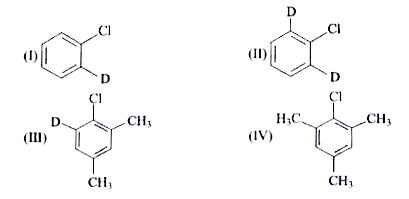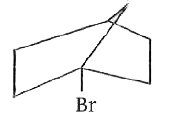Which of the following undergoes nucleophilic substitution exclusively by SN1 mechanism?
Ethyl chloride
Isopropyl chloride
Benzyl chloride
Chlorobenzene
The correct Answer is:C
To determine which of the following undergoes nucleophilic substitution exclusively by the S1N mechanism, we need to analyze the stability of the carbocations formed during the reaction. The S1N mechanism involves two main steps: the formation of a carbocation intermediate and the subsequent attack of the nucleophile.
1. Understanding the S1N Mechanism:
- The S1N (Substitution Nucleophilic Unimolecular) mechanism is a two-step process:
1. Formation of a carbocation by the departure of the leaving group (halide ion).
2. Nucleophilic attack on the carbocation to form the final product.
- The rate of the reaction depends on the stability of the carbocation formed.
2. Analyzing the Compounds:
- We need to consider the stability of the carbocations that would form from the given compounds:
- Benzyl Chloride (C₆H₅CH₂Cl): When the chlorine leaves, it forms a benzyl carbocation (C₆H₅CH₂⁺), which is stabilized by resonance with the aromatic ring.
- Isopropyl Chloride ((CH₃)₂CHOCl): This forms a secondary carbocation, which is relatively stable due to hyperconjugation.
- Ethyl Chloride (C₂H₅Cl): This forms a primary carbocation, which is less stable.
- Chlorobenzene (C₆H₅Cl): The formation of a carbocation from chlorobenzene is not favorable due to the strong carbon-chlorine bond and the sp² hybridization of the carbon.
3. Comparing Carbocation Stability:
- The stability order of carbocations is:
- Benzyl carbocation > Isopropyl carbocation > Ethyl carbocation > Primary carbocation (from ethyl chloride).
- Benzyl carbocation is particularly stable due to resonance stabilization from the adjacent aromatic ring.
4. Conclusion:
- Among the compounds analyzed, Benzyl Chloride undergoes nucleophilic substitution exclusively by the S1N mechanism because it forms a highly stable carbocation that is stabilized by resonance.
Final Answer:
Benzyl Chloride (C₆H₅CH₂Cl) undergoes nucleophilic substitution exclusively by the S1N mechanism.
- The S1N (Substitution Nucleophilic Unimolecular) mechanism is a two-step process:
1. Formation of a carbocation by the departure of the leaving group (halide ion).
2. Nucleophilic attack on the carbocation to form the final product.
- The rate of the reaction depends on the stability of the carbocation formed.
- We need to consider the stability of the carbocations that would form from the given compounds:
- Benzyl Chloride (C₆H₅CH₂Cl): When the chlorine leaves, it forms a benzyl carbocation (C₆H₅CH₂⁺), which is stabilized by resonance with the aromatic ring.
- Isopropyl Chloride ((CH₃)₂CHOCl): This forms a secondary carbocation, which is relatively stable due to hyperconjugation.
- Ethyl Chloride (C₂H₅Cl): This forms a primary carbocation, which is less stable.
- Chlorobenzene (C₆H₅Cl): The formation of a carbocation from chlorobenzene is not favorable due to the strong carbon-chlorine bond and the sp² hybridization of the carbon.
- The stability order of carbocations is:
- Benzyl carbocation > Isopropyl carbocation > Ethyl carbocation > Primary carbocation (from ethyl chloride).
- Benzyl carbocation is particularly stable due to resonance stabilization from the adjacent aromatic ring.
- Among the compounds analyzed, Benzyl Chloride undergoes nucleophilic substitution exclusively by the S1N mechanism because it forms a highly stable carbocation that is stabilized by resonance.
Benzyl Chloride (C₆H₅CH₂Cl) undergoes nucleophilic substitution exclusively by the S1N mechanism.
Similar Questions
Knowledge Check
Which of the following will not undergo nucleophilic aromatic substitution ?
 AI, II and IIIBII and IVVCIII and IVDonly IV
AI, II and IIIBII and IVVCIII and IVDonly IVWhich one of the following undergoes nucleophilic aromatic substitution at the fastest rate ?
A B
B C
C D
D
Which of the following reactant will not favour nucleophilic substitution reaction ?
A BPh-BrCCH3CH3∣C∣CH3−CH2−BrDAll the above
BPh-BrCCH3CH3∣C∣CH3−CH2−BrDAll the above
Which one of the following compounds most readily undergoes substitution by SN2 mechanism?
View SolutionWhich of the following is least reactive towards nucleophilic substitution?
View SolutionWhich of the following compounds undergoes mucleophilic substitution reaction most easily?
View SolutionWhich of the following is least reactive in a nucleophilic substitution reaction?
View SolutionWhich ofthe following is most reactive towards nucleophilic substitution reaction ?
View Solution
